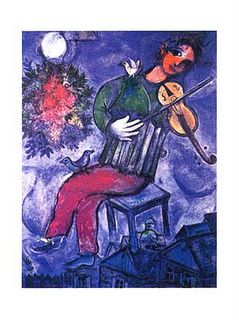Commitment

Marc Chagall (The Blue Violinist)
“An uncommitted life isn’t worth living. We need tough-minded thinkers, gadflies, doubters. Doubt is an angel, not a devil: it assumes an order of truth.” (Marshall Fishwick)
Is heresy is purely an intellectual venture? Maybe some people are just born rebellious or with the type of minds that rely on cynicism, skepticism, and see through to the core of something (or just think they do.) In a sense, our Chinuch creates this, since we are taught in Chedorim, Yeshivos, and Kollelim to see pain as pleasure and black as white. Our whole primary education is based on the world being false, tempting, and testing; a thing which requires restraint to overcome and a critical eye to recognize for what it really is. Perhaps the groundwork for Apikorsis is borne out of the fundamentals of Yiddishkeit itself.
Yiddishkeit claims, at its foundation, to encourage questions, but NOT questioning. Questions about Torah are the sign of a Talmid Chocham or Tzadik eager to understand the deeper meanings of Torah, and how they are applied. Yet, that is where the questioning ceases. Questions of the religion are another category altogether. One transforms from Tzadik to Apikores merely by swapping out one preposition for another. It is sometimes subtle, but always a dangerous affair.
How can we know when to shut off this Chakira that we are taught to apply? Our Melamdim and Rabbonim make their livings teaching us to discern between kosher und treife, tumah vetaharah, mutar ve ossur, and other important distinctions, giving us the tools and skills necessary to make these critical judgments on our own, but don’t teach us how to turn it off! Faithful who become heretics, and I think this is my issue, are like soldiers that are trained to spot and kill a powerful enemy, but when sent out into the world, their training, having affected them so deeply and so powerfully, could not be controlled by those who trained them. Everyone becomes the ‘enemy.’ I am trained to face this enemy on the street, in the shul, and in the mirror. Do they think that I can just shut it off or simply ignore the method of Chakira that they taught me? That they told me was the single way to discern Emmes from Sheker?
I am beginning to think that maybe true apikorsis can ONLY come from Emunah and Lomdus. (Maybe the Chazon Ish was right?) I don’t define Emunah only as faith. That’s wimpy. Emunah is the applied commitment to an ideal, and is better defined as a degree of Mesiras Nefesh. In Yiddish we call it ‘ibergegebenkeit.’ This is the deep emotional impetus that drives one to love Torah and Mitzvos, and the Lomdus is the method by which we learn to love and how to love. Yiddishkeit wasn’t just a lifestyle for us. It was our Tochen, our raison d’etre; the Derech by which we were taught to view the world and everything in it, in a critical and direct manner, and could not be simply shut off or restrained. It manifests itself in the need for personal integrity and accountability. One could not live with oneself knowing the principles were being violated.
It is very much akin to the dedicated police detective who is trained to see and prosecute criminal activity, but is asked to ignore such behavior when it he finds it among his fellow officers. Sorry, no can do. It’s that damned ‘ibergegebenkeit’ again. I cannot be expected to apply the criteria in one place and ignore it in another.


0 Comments:
Post a Comment
Subscribe to Post Comments [Atom]
<< Home